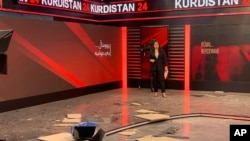Iran’s ballistic missile strike on the northern city of Irbil, which damaged some residential structures but caused no casualties, has been criticized by leaders from across Iraq’s political spectrum.
Iran’s Revolutionary Guard Corps (IRGC) claimed credit for the late-night strike in which 12 ballistic missiles were fired against an alleged Israeli “strategic center of conspiracy” in the Kurdish city, according to a statement.
Muqtada al-Sadr, the influential Shiite cleric whose political party won majority seats in Iraq’s most recent parliamentary elections, issued a statement calling on the government to “submit a protest note to the United Nations and the Iranian ambassador asking for guarantees that [such an attack] will not be repeated in the future.”
Analysts say Sadr’s relatively strong reaction, which went beyond a mere condemnation, indicates Iran’s waning popularity in the oil-rich country, where Iran-backed political parties have lost ground in the recent parliamentary elections.
Mahmoud Othman, a veteran Kurdish politician who served as a member of the Iraqi parliament, tied the Iranian attack to a political deal between Sadr, the Kurdistan Democratic Party (KDP), which rules Irbil, and Sunni politicians to form a government. The agreement excludes Iran-allied Shiite parties, namely the Fatah Alliance.
“Iran has stated it publicly that it’s behind the attack,” Othman told VOA by phone.
“[Iranians] say they have targeted Israeli bases in the region. In reality, they are not content with KDP’s position, allying with al-Sadr and others. They see this as undermining their groups,” he added.
More than six months have passed since Iraq held parliamentary elections in October, but the process of forming a new government has been hampered by political bickering and failed negotiations.
It’s unclear if the attack will have any impact on the government-formation process.
Local media published images of the aftermath of the missile attack, which damaged at least one three-story structure in the city and a studio for a local television channel.
Security footage released by Kurdistan24 TV appeared to show the attack’s shockwaves causing ceiling tiles and glass to fall from the station’s studios.
Irbil Governor Omed Khoshnaw told VOA that the attack, which coincided with slain Iranian General Qasem Soleimani’s birthday, targeted the U.S. consulate in the city, but the building didn’t sustain damage. Soleimani was assassinated in a U.S. drone strike ordered by former President Donald Trump two years ago.
U.S. National Security Advisor Jake Sullivan said in a statement, “We will support the Government of Iraq in holding Iran accountable, and we will support our partners throughout the Middle East in confronting similar threats from Iran. The United States of America stands behind the full sovereignty, independence, and territorial integrity of Iraq.”
The U.S. embassy in Baghdad also condemned the missile attack, calling it a “criminal” act for which Iran must be held accountable.
“The United States condemns the criminal attack on civilian targets in Erbil,” said the embassy in a statement.
“Iranian regime elements have claimed responsibility for this attack and must be held accountable for this flagrant violation of Iraqi sovereignty and for terrorist attacks on innocent civilian properties.”
Iraq’s outgoing prime minister, Mustafa al-Kadhimi, called the attack an act of “terror.”
“The attack that targeted the dear city of Erbil and terrorized its residents is an attack on the security of our people,” he said on Twitter. Mohammed al-Halbousi, the speaker of the Iraqi parliament, said the attack necessitated “a unified and firm national stance to deter and confront it.”
Because of the lengthy border they share with Iran, the Kurds in the country’s north are the most concerned about the attack. The president of Iraqi Kurdistan, Nechirvan Barzani, has appealed to the international community for help against the region’s neighbor’s “cowardly and unwarranted” attacks.
“Targeting Erbil in such a way, and the repeat of such attacks, is an alarming development, as it is a blatant violation of peace, stability, and sovereignty of Iraq,” read an English-language statement by Barzani.
“I urge the federal government of Iraq and the international community to end such aggressions and do their best to prevent further violations of the sovereignty and stability of the country and the security and peace of its citizens.”
This story was originated in VOA’s Kurdish service with contributions by Dilshad Anwar.




